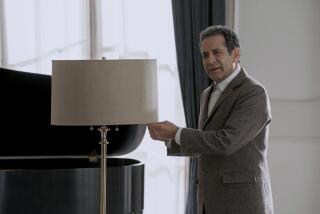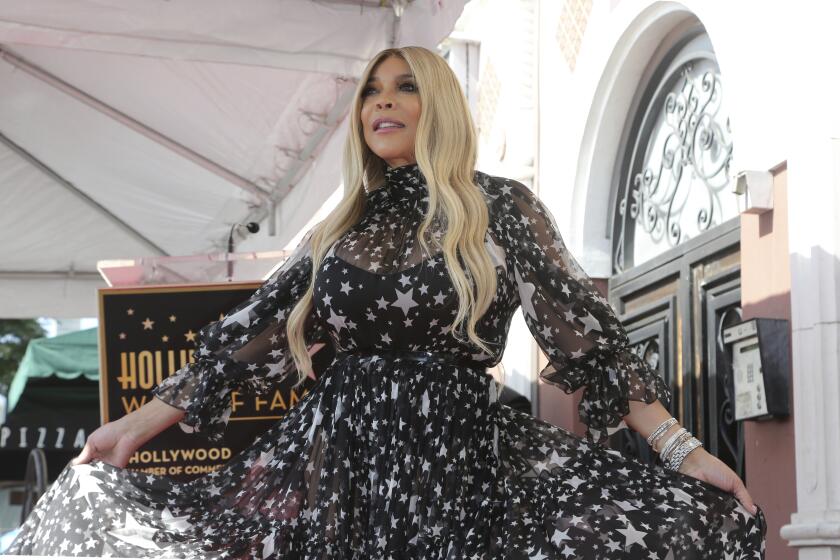The second season of ‘Master of None’ features a complicated relationship with pork
There are a couple of things you need to know going into the second season of Netflix’s award-winning comedy-drama “Master of None,” which began streaming Friday.
Number one: The first two episodes take place in Italy. Maybe creators Aziz Ansari and Alan Yang like good food and wine and talked Netflix into bankrolling the trip, since we last saw Ansari’s main character Dev impulsively board a plane en route to pursue his love of pasta-making. (Note to Netflix: Trips abroad aren’t supposed to take place until, like, the fourth season. Please see “The Brady Bunch” Hawaiian vacation.)
Dev, who spent most of last season home in New York, with a quick detour to Nashville, is all of a sudden making pasta and learning Italian and we’re supposed to find it as entertaining as he does. It’s not. Even when he attempts to parody the black-and-white classic “Bicycle Thieves” (in Dev’s case, the stolen item is his cellphone).
Here’s the second thing: It’s worth hanging in past the first two draggy episodes abroad. Because when Dev returns to New York, “Master of None” is great again, picking up where last season left off with the thirtysomething trying to make a living as an actor, find the right girl and navigate the high expectations of his immigrant parents. If the setup sounds generic, it’s Ansari’s unique perspective on American life that makes this show work. He knows how to mine pop culture for material that connects with anyone raised around a radio, TV or video game in the ’80s or ’90s.
Dev’s an Indian American whose childhood was steeped in “Star Wars” and Quran surahs his parents made him read. He’s an aspiring actor in a field in which people of his hue rarely find non-terrorist roles. He is a great observer with a knack for fitting in, even if he’s often considered a fish out of water.
Season 2 may start out slow, but by Episode 3, “Religion,” it makes up for the early slog.
It kicks off with various scenarios of kids being forced to attend religious services with their parents — a Catholic, a Jew, a Hindu, all whining that they don’t want to go.
It cuts to Dev as a child, visiting a friend’s house, where he eats his first slice of bacon. His mom calls in the middle of the meal, he tells her what he’s eating, she scolds him and says Muslims can’t eat pork. “It’s haram!” (forbidden).
Young Dev then has a decision to make. Cue rapper Tupac’s song “Only God Can Judge Me” as he continues to enjoy the forbidden strip of deliciousness.
From there he hides his love of pork, and later alcohol, from his parents just as some of his friends have hidden the fact that they’re gay from their devout Christian parents.
But as any kid raised in even a secular Muslim household knows, breaching the pork rule is something that just isn’t talked about because IT NEVER HAPPENS! Except it does, and Ansari has the guts here to tackle it.
His Muslims aren’t the ones of “Homeland,” who always seem to be praying to scary music. They come in all shapes and sizes, with varying degrees of religiosity. Some are pious, others avoid mosque like it’s a trip to the dentist.
When an “auntie and uncle” on the more pious end of the spectrum come to town, his father and mother (played by Ansari’s real-life parents) ask Dev to join them for dinner. Dev knows this means fronting as though he’s more observant than he is.
His dad greets him with “As-salaam-alaikum” (peace be unto you) in front of the couple.
Dev takes a deep breath and then puts on the show for his parents: “Wa’alaikum salaam,” he answers.
Just hours before he’d skipped Eid prayer to attend a barbecue festival, eating baby back ribs with another Muslim friend to the tune of Poison’s “Nothin’ But a Good Time.”
But after a few days of pretending, he can’t stand it anymore: When ordering at a Chinese restaurant with his parents and auntie and uncle, he orders a pork dish. They’re all aghast.
“I’m actually not that religious, and I eat pork,” he admits. “But it’s OKay ’cause I’m a good person, I’m 33, I can make those decisions and I can eat what I want and I want pork with the broccoli.”
His mom, who slaps him on the back of the head, is devastated.
She says later at home, “I can’t believe you did this. Auntie and Uncle were very offended.”
Dev says to his parents, “We all have our own interpretation [of the faith]. You eat non-halal, used to smoke cigarettes, you don’t wear hijab. Why can’t I have my interpretation where I’m just nice and I eat pork?”
“I get it,” he continues. “For you guys, your religion has a cultural value. For me it’s being called terrorist and being pulled out of airport lines.”
His mom cuts him off: “That’s because you lost your passport three times.”
For anyone, the episode is about coming to grips with the religion you were raised with. For kids of immigrants, it’s also about cutting a new path between cultures.
As Dev’s father says to him, “It’s not about eating pork. It’s not about the religion. It’s about you ignoring us and not realizing who you are. … When you act like this, we feel we have failed you.”
A good comedy can make you cry.
In the end, Dev reads the Quran and finds a passage that supports his end of the argument.
He texts dad: “See, you’re not supposed to be forcing others to be religious.”
Dad texts back: “At least you read it. AND DON’T EAT NO CRISPY PORK.”
Dev: “I’ll try … does bacon count?”
Dad: “Boy, get outta here.”
They are joking now. They have gotten over the hump.
And in the process, they’ve changed the way Muslims are seen on TV.
------------
‘Master of None’
Where: Netflix
When: Anytime
Rating: TV-MA (may be unsuitable for children under the age of 17)
More to Read
The complete guide to home viewing
Get Screen Gab for everything about the TV shows and streaming movies everyone’s talking about.
You may occasionally receive promotional content from the Los Angeles Times.







